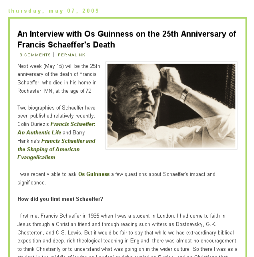
Francis Schaeffer influenced (to some degree) almost every future evangelical pastor and institutional leader of my generation. (What generation? you ask. Well, I squeezed the adventures of both high school and college into the ’60s, paralleling the Beatles’ journey from their early Hamburg recording of “My Bonnie” to their late psychedelic movie “Yellow Submarine.”)
Schaeffer was a man of contradictions, but his passion for pursuing truth–and pushing others to do the same–was unflinchingly unambiguous and brought many young adults in an experiential generation back to reason.
Christian social critic Os Guinness was one of those so influenced. To mark the 25th anniversary of Schaeffer’s death (coming up next week on May 15), Justin Taylor interviewed Os for his “Between Two Worlds” blog.
Some highlights:
[A] friend took me to hear a strange little man in Swiss knickers, with a high-pitched voice, terms all of his own such as ‘the line of despair,’ and appalling mispronunciations and occasional malapropisms. But I was intrigued and then hooked. Schaeffer was the first Christian I met who was … capable of connecting the dots and making sense of the extraordinary times that puzzled and dismayed most people. Two years later, I went to the Swiss l’Abri … [T]he summer of 1967 became the most revolutionary period in my entire life. I have never been the same since.
I have never met anyone with such a passion for God, combined with a passion for people, combined with a passion for truth. That is an extremely rare combination, and Schaeffer embodied it. It is also why so many of his scholarly critics completely miss the heart of who he was, and why his son’s recent portrayal of his father is such a travesty and an outrage.
[H]e had a massive impact on the lives of individuals, including me, but his wider significance was as … a door opener. When almost no Evangelicals were thinking about culture and connecting unconnected dots, Schaeffer not only did it himself but blazed a trail for countless others to follow. Many who trumpet their disagreements with him today owe their very capacity to disagree to his influence a generation ago. A little man in stature, he was a giant in influence …
Read the full interview here.









